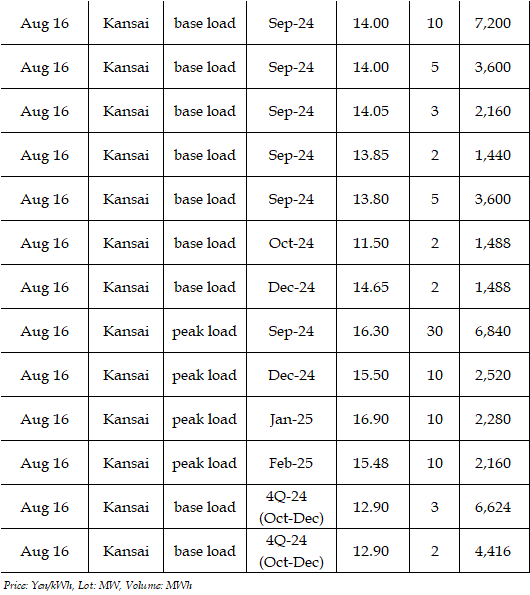|
In the day-ahead market on JEPX (Japan Electric Power Exchange), the 24-hour spot power prices on a weekly average basis for Aug 12-16 delivery stretched falls from the previous week in both East Japan (50Hz) and West Japan (60Hz). Demand shrank as factories operations were suspended during the Obon break, generating downside pressure on spot prices. Especially in West Japan, a hub of leading automobile factors, demand posted a remarkable drop. As a result, spot prices in West Japan deepened losses, pushing the East-West price gap into a normal pattern in favor of the East, in contrast to a reverse pattern in favor of the West until a week before.
In Tokyo and Kansai, the key areas in East Japan and West Japan, the 24-hour average posted a difference in favor of the East by Yen 1.14 for Aug 12 delivery, Yen 1.26 for Aug 13 delivery, Yen 2.18 for Aug 14 delivery, Yen 1.14 for Aug 15 delivery, and Yen 2.09 for Aug 16 delivery.
In the fuel markets, LNG, coal and crude oil prices strengthened across the board from the end of the previous week.
DES Northeast Asia spot LNG prices hovered in the high $13 level per mmBtu for prompt September 2024 arrival as of Aug 15, notching up by about 5cts from the end of the previous week (Aug 9). The LNG market found support from a firmness in European natural gas prices, combined with military tensions in Ukraine and Middle East. But the rise in LNG prices was limited by slack buying interest in spot cargoes, at a time when end-users in Northeast Asia preferred to meet their requirements with term contract cargoes. The Ministry of Economy, Trade and Industry (METI) announced on Aug 14 that Japan's LNG inventories for power generation stood at 1.98 mil mt as of Aug 11, up 70,000mt from a week before. The level was up from 1.72 mil mt as of end-August last year, but down from the average of past five years at 2.02 mil mt.
FOB Newcastle thermal coal prices in Australia stood around $150 per ton for August 2024 loading as of Aug 15. The level was up about $4.00 from the end of the previous week, in tandem with a strength in gas and crude oil prices.
In the crude oil market, WTI crude for September 2024 stood around $78 as of the morning on Aug 16 while Brent crude for October 2024 was trading in the high $80 level. Both WTI and Brent were up slightly more than $1 from the end of the previous week. At the beginning of the week, crude futures extended a rally amid escalating geopolitical risks in Middle East after Iran showed a readiness to beef up retaliation against Israel. But crude futures gave up much of the early gains amid prospects for loosening supply-demand fundamentals following bearish monthly reports in August released by the Organization of the Petroleum Exporting Countries (OPEC) and US Energy Information Administration (EIA). An unexpected buildup in US crude oil inventories also boosted downside pressure on crude futures.
The actual highest price during the week was at Yen 20.15 in West Japan for Aug 15 delivery. Meanwhile, the actual lowest price during the week was at Yen 8.50 in West Japan for Aug 14 delivery.
By area, the weekly average of the 24-hour spot prices was at Yen 12.60 in Hokkaido, down Yen 0.93 from the previous week, Yen 12.79 in Tohoku, down Yen 0.75, Yen 13.86 in Tokyo, down Yen 1.58, Yen 12.73 in Chubu, down Yen 3.91, Yen 11.90 in Hokuriku and Kansai, down Yen 4.72, Yen 11.90 in Chugoku, down Yen 4.73, Yen 11.90 in Shikoku, down Yen 4.89, and Yen 11.80 in Kyushu, down Yen 2.98.
In the JEPX auction, volumes of offers were 1,304.38 mil kWh on a weekly average basis, up 6.8% from the previous week. Meanwhile, bids on a weekly average basis shrank by 9.5% to 1,015.77 mil kWh. The weekly average of trade volumes dwindled by 7.4% to 769.78 mil kWh.
Power demand in nine areas of Japan during Aug 12-16 was a combined 12,260.49 mil kWh, down 16.8% from 14,736.77 mil kWh during Aug 5-9. The figure was up 2.2% from the corresponding period a year earlier. Demand during Aug 14-18, 2023 after day of week adjustment was 11,995.53 mil kWh.
In the JEPX forward market, no deals were confirmed during Aug 12-16.
Deals reported on TOCOM (Tokyo Commodity Exchange) during Aug 12-16 were as below.

Deals reported on EEX (European Energy Exchange) during Aug 12-16 were as below.






In the fourth week of August, spot prices are expected to rise from the third week. Many factories are scheduled to return to normal operation after the Obon break. In addition, the weather is forecast to be unfavorable across Japan throughout the week, leaving limited scope of photovoltaic generation. Meanwhile, the highest temperature is forecast to be around 35 degrees in West Japan as summer heat is expected to ease a bit from the third week. Even in East Japan, the day's high will be capped at 32-33 degrees in Kanto, levels that will be below the extremely hot day indicator of 35 degrees. Thus, spot prices are unlikely to show extreme hikes.
|
JEPX: System Price (Day Ahead 24 hours)
|
|
Weekday Price
|
12-Aug
|
13-Aug
|
14-Aug
|
15-Aug
|
16-Aug
|
|
24-Hour Ave
|
12.98
|
12.62
|
12.27
|
12.26
|
12.72
|
|
Volume (MWh)
|
753,613
|
788,160
|
758,924
|
772,613
|
775,597
|
|
(unit: yen per kWh) (date: delivery day)
|
|
|

|